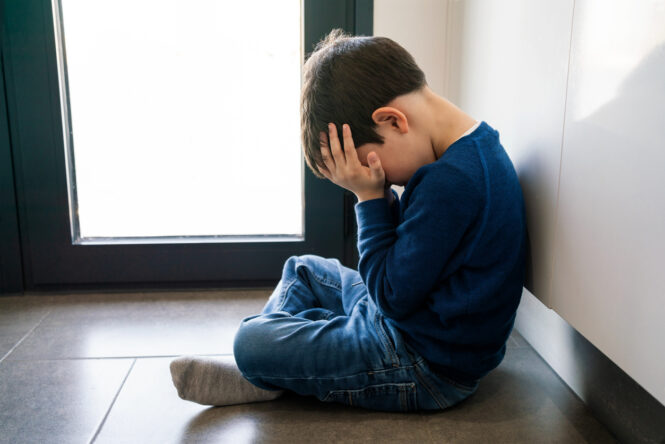As your kids become adults, it’s only natural that your relationship will become slightly more distanced, even if only temporarily.

After all, they want to spread their wings, assert their independence, and start to figure out life on their own terms. However, there’s a difference between your adult children wanting to forge their own path and them completely pulling away from you in ways that make you feel like you don’t even know them anymore. If this is happening in your dynamic, here’s why they might be purposely driving a wedge between you.
1. They want to make their own choices — without being judged for them.

As adults, your kids want to make their own decisions—whether it’s about their career, relationships, or lifestyle. If they feel like they’re being judged or criticised for these choices, they might retreat to avoid confrontation. Instead of offering unsolicited advice, try listening with an open mind. Sometimes, just showing you’re there without trying to fix everything can make all the difference.
2. You find it hard to respect their boundaries.

Boundaries are a key part of any adult relationship, and that includes the one between you and your kids. Constantly calling or showing up unannounced can feel intrusive to them, especially as they establish their own lives. Give them the space they need and trust that they’ll reach out when they’re ready. Respecting their boundaries helps them feel independent and valued.
3. They’re fed up with one-sided conversations.

If your conversations tend to focus mostly on your life and what’s going on with you, your kids might feel like they’re not being heard. It’s important to show genuine interest in their lives—ask about their work, their friendships, their passions, and really listen. When you engage with them on what matters to them, it helps create a deeper connection.
4. They feel obligated rather than valued.

If your interactions start to feel more like obligations, your kids might begin to pull back. Instead of framing visits or calls as something they “have to” do, try to create a space where spending time together feels natural and enjoyable. When they feel valued and not just expected to check in, they’ll be more likely to make the effort to reconnect.
5. They’re dealing with their own struggles.

Sometimes, your child’s distance has nothing to do with you. They might be dealing with personal struggles—stress at work, mental health challenges, or relationship issues—that make them pull back a bit. Let them know you’re there for support, but don’t pressure them to open up until they’re ready. Giving them room to deal with their own issues can help them feel safe and supported when they do want to talk.
6. You still have old issues that haven’t been resolved.

Old problems, especially from childhood, can still weigh heavily on adult relationships. If those issues haven’t been addressed, they can create an emotional distance. Be open to having honest and healing conversations about the past. Acknowledging where things went wrong and taking responsibility when needed can help clear the air and bring you closer.
7. They feel pressured to live up to expectations.

Whether those expectations are verbal or implied, feeling like they can never measure up can cause your kids to pull away. They might feel like they’re constantly falling short and are scared of disappointing you. Let them know that you’re proud of them just as they are, and remind them that their unique path in life is something to celebrate, not something to compare to anyone else’s.
8. You dismiss their independence.

As adults, your children want to be seen as capable, independent individuals. If they feel like you’re constantly involved in their decisions or offering advice they didn’t ask for, they might start pulling away. Trust that they can make their own decisions, and when they need guidance, they’ll come to you. Giving them space to assert their independence helps maintain a healthier, more balanced relationship.
9. They feel guilted into calling or spending time with you.

Using guilt to encourage visits or calls can create a sense of obligation rather than fostering a genuine connection. Instead of saying things like, “You never visit anymore” or “I guess you’re too busy for family,” try sharing how much you enjoy spending time with them in a positive, playful way. This way, the time you do spend chatting or being together will feel more heartfelt and less like a chore.
10. They sense unresolved tension in the family.

If there are ongoing tensions between family members, your adult children may distance themselves to avoid getting caught in the middle. It’s important to address any family issues head-on and work on creating a peaceful and respectful environment. When your kids sense calm and peaceful vibes in the family, they’ll be more likely to want to be a part of it.
11. They don’t feel emotionally safe.

If your children feel like they’re going to be judged, criticised, or emotionally invalidated, they may choose not to share their lives with you. It’s crucial to create an emotionally safe space where they feel heard and understood, even if you don’t agree with them. Simple phrases like, “I hear you” or “I understand how you feel” can go a long way in making them feel supported.
12. Communication is stuck in old patterns.

If you still talk to your adult children as though they’re still kids, they might feel the need to pull away in order to assert their adulthood. It’s important to adapt your communication style and treat them as equals. Recognise their growth and respect their autonomy. Shifting your perception shows them that you see them as capable adults, which can strengthen your connection.
13. They feel overshadowed by their siblings.

If they feel like one of their siblings is favoured over them, even unintentionally, it can create resentment. Make an effort to spend quality, one-on-one time with each of your children. Celebrate their unique qualities and achievements, and make sure they feel seen and appreciated as individuals.
14. They’re overwhelmed by “adulting” responsibilities.

Adult life comes with a lot of obligations, and your child may be feeling overwhelmed by work, relationships, or personal commitments. If they’re pulling away, it’s often because they’re juggling too much at once. Acknowledge their busy lives and let them know you understand. Offering patience and not taking their distance personally can help ease the pressure they’re feeling.
15. They don’t feel appreciated for who they are.

Your kids want to feel loved and appreciated, not just for their achievements, but for who they truly are. Make sure to express gratitude for their presence in your life, not just when they’ve done something impressive. A heartfelt “I’m proud of you” can go a long way in reinforcing your bond and reminding them that they’re valued for just being themselves.




